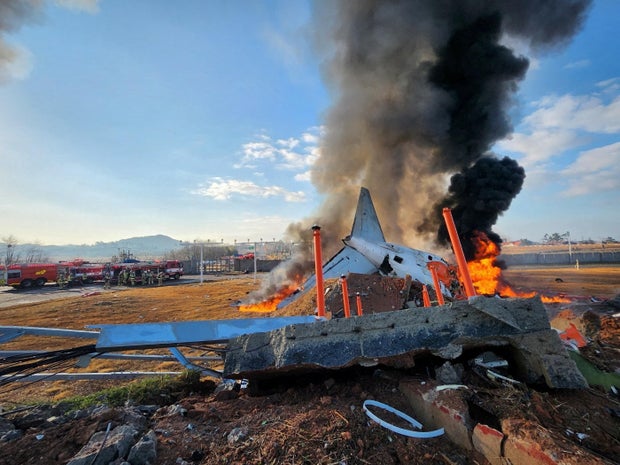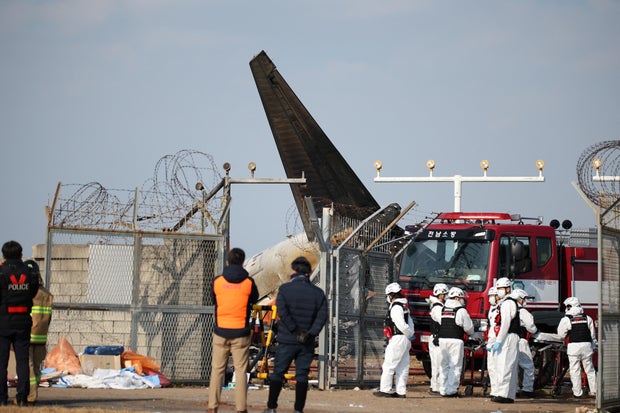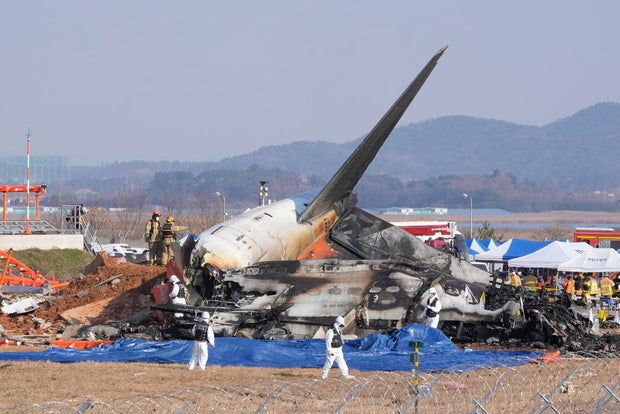Passenger jet engulfed in flames after crash-landing in South Korean airport, killing 179; 2 crew members survived
A passenger plane burst into flames Sunday morning after it skidded off a runway at a South Korean airport and slammed into a concrete fence when its front landing gear apparently failed to deploy, killing 179 of the 181 people on board, officials said, in one of the country's worst aviation disasters.
The National Fire Agency said rescuers raced to pull people from the Jeju Air passenger plane in the town of Muan, about 180 miles south of Seoul. The Transport Ministry identified the plane as a 15-year-old Boeing 737-800 jet that was returning from Bangkok when it crashed at 9:03 a.m. local time.
At least 179 people — 84 women, 82 men and 11 others whose genders weren't immediately identifiable — died in the fire, the South Korean fire agency said. Emergency workers pulled out two people, both crew members, from the tail of the plane and local health officials said they remain conscious.
Among the 179 bodies found, officials have so far identified 88 of them, the fire agency said. The authorities said the severity of the crash made it difficult to identify the bodies.
South Korean news agency Yonhap reported that there were believed to be 173 South Korean passengers aboard the flight and two Thai nationals. There were also six crew members aboard the flight, Reuters reported.
Lee Jeong-hyeon, chief of the Muan fire station, told a televised briefing that the plane was destroyed, with only the tail assembly remaining recognizable among the wreckage.
Footage of the crash aired by YTN television showed the Jeju Air plane skidding across the airstrip, apparently with its landing gear still closed, and colliding head-on with a concrete wall on the outskirts of the facility. Local TV stations aired footage showing thick pillows of black smoke billowing from the plane engulfed with flame.
Workers were looking into what caused the crash, including whether the aircraft was struck by birds that caused mechanical problems, Lee said. Senior Transport Ministry official Joo Jong-wan separately told reporters that government investigators arrived at the site to investigate the cause of the crash and fire.
Transport Ministry officials later said the plane had first attempted to land, but the control tower issued a bird strike warning. It ascended before trying to land again. Two minutes later, the plane sent a "mayday" distress signal and attempted to land on a different runway. It landed on the runway three minutes later without lowering its landing gear.
The aircraft failed to reduce its speed until it reached the end of the runway, veered off and, collided with a fence wall, and was set ablaze
Jong-wan said workers have retrieved the flight data and cockpit voice recorders of the plane's black box, which will be examined by government experts investigating the cause of the crash and fire. He said it may take months for investigators to complete their probe. The runway at the Muan airport will be closed until Jan. 1, the ministry said.
Thailand's prime minister, Paetongtarn Shinawatra, expressed deep condolences to the families of those affected by the accident through a social media post. Paetongtarn said she had ordered the Ministry of Foreign Affairs to provide assistance immediately.
Acting South Korean President Choi Sang-mok ordered an all-out rescue response, Reuters reported. Choi only became acting president Friday, replacing the previous acting president, Han Duck-soo, following Han's impeachment. It all comes in the wake of the government crisis caused by the Dec. 3 martial law declaration from former President Yoon Suk Yeol, who was later impeached as well.
In an emergency meeting on Sunday evening, Choi declared a national mourning period until Jan. 4, Reuters reported.
Jeju Air in a statement expressed its "deep apology" over the crash and said it will do its "utmost to manage the aftermath of the accident."
In a televised news conference, Kim E-bae, Jeju Air's president, bowed deeply with other senior company officials as he apologized to bereaved families and said he feels "full responsibility" for the incident. Kim said the company hadn't identified any mechanical problems with the aircraft following regular checkups and that he would wait for the results of government investigations into the cause of the incident.
President Biden, in a statement on Sunday, said he and first lady Dr. Jill Biden are "deeply saddened" about the loss of life as a result of the crash.
"As close allies, the American people share deep bonds of friendship with the South Korean people and our thoughts and prayers are with those impacted by this tragedy," he said. "The United States stands ready to provide any necessary assistance."
This is one of the deadliest disasters in South Korea's aviation history. The last time South Korea suffered a large-scale air disaster was in 1997, when a Korean Air plane crashed in Guam, killing 228 people on board.
This comes after 38 people were killed and 29 more injured when an Azerbaijan Airlines plane bound from the Azerbaijani capital of Baku to the Russian city of Grozny crashed in Aktau, Kazakhstan, on Christmas Day. On Saturday, Russian President Vladimir Putin issued an apology for the crash, and the Kremlin said in a statement that air defense systems were firing near Grozny airport as the airliner "repeatedly" attempted to land there. It did not, though, explicitly say one of these hit the plane.






